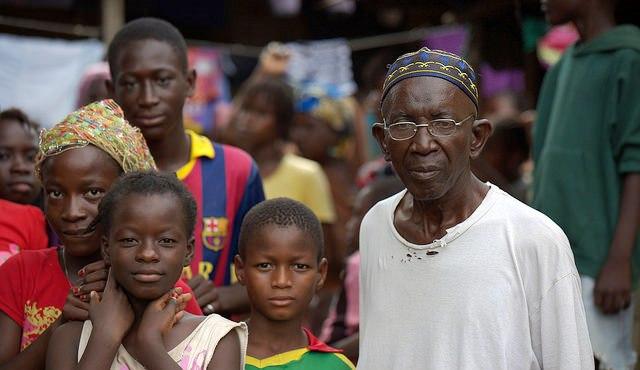Ebola-hit nations in West Africa showed more signs of progress last week, boasting a sharp drop in Guinea's cases and the lowest weekly total of the year so far, the World Health Organization (WHO) said today.
The WHO said 79 lab-confirmed Ebola cases were reported in the three countries last week, down from 150 the week before. They include 45 infections in Guinea, 33 in Sierra Leone, and 1 in Liberia. The outbreak total has now reached 24,872 confirmed, probable, or suspected cases in the three countries.
Outbreak hot spots in the region are now limited to two capitals—Conakry and Freetown—and a few of their surrounding districts. Deaths increased by 132 last week, boosting that total to 10,311.
Signs of improvement, obstacles
This week's WHO report shows a sharp drop in cases and some improved response indicators for Guinea, which has seen Ebola activity fluctuate several times. Its 45 illnesses last week was less than half of the 95 it reported the week before. Also, the country experienced a sharp drop in the number of Ebola infections detected only after people had died in the community.
However, underscoring the tough challenges Guinea still faces, more unsafe burials were reported compared with the week before, and fewer than half of the new cases occurred in known contacts, the WHO said. It added that those factors suggest that Guinea's outbreak is still fueled by unknown transmission chains.
Sierra Leone's Ebola markers continued to improve, according to the WHO. Cases dropped from 55 to 33 last week, and an increasing percentage of confirmed cases are occurring in known contacts, a sign that responders are getting a better grip on tracking the transmission chains. The WHO added that the country's case total last week is its lowest since early June of 2014.
Though no unsafe burials were reported in Sierra Leone last week, 7 of 56 Sierra Leoneans who died from Ebola last week were diagnosed only after they had died in the community, which shows that some people sickened by the disease aren't being identified, isolated, and treated for Ebola.
Liberia's first case in 3 weeks, reported recently in the media, involves a patient who first sought care on Mar 19 at a Monrovia hospital and was diagnosed the next day as having Ebola virus disease (EVD). Investigations into how the woman was infected are ongoing, but Liberian health officials have said she is dating an Ebola survivor and that samples from her boyfriend have been obtained for testing, the Associated Press (AP) reported yesterday.
Ebola survivors aren't typically considered contagious, but some studies suggest the virus can remain in semen, and the WHO urges survivors to abstain from sex for at least 3 months after treatment.
The WHO said 71 of the woman's contacts have been identified and are being monitored. Though Liberia's Ebola cases have dropped off dramatically in recent months and have stayed low, the country is still evaluating several suspected cases—last week labs tested 238 new samples for Ebola.
Only one new Ebola infection was reported in a healthcare worker last week—in Conakry—lifting the total number of health workers infected in the outbreak to 853, which includes 494 deaths.
MSF airs response concerns
Meanwhile, Doctors without Borders (MSF) warned yesterday in its latest assessment that the outbreak is still far from over, with the number of weekly cases reported from the region still higher than in any previous outbreak, and too many cases still coming from unknown transmission chains. "One case can be enough to reignite the epidemic," it said.
It said two pillars of the response are missing, both of them crucial for getting to zero cases: regional cooperation to ensure that new cases aren't "imported" into Ebola-free zones and community awareness, which remains low in some areas.
MSF also noted that concerns persist about health needs that aren't related to Ebola, such as damages to an already-weak public health system and shuttered hospitals. It also said the outbreak response has created gaps in preventive health services, such as routine immunizations and ongoing care for people with HIV and other chronic conditions.
Children with EVD
In other news, a WHO report today in the New England Journal of Medicine noted that children 15 years and younger who have EVD exhibit different symptoms than do older children and adults, and the youngest kids seem to be hit the hardest.
In a letter to the journal, members of the WHO Ebola Response Team included data on 2,991 children in the three outbreak countries, among whom investigators knew of a final outcome in 1,378. The researchers wrote that children under 16 years old constitute 21% of patients with EVD.
The authors noted that children 15 and younger were more likely to present with a fever than were older patients. They also were less likely to report pain in the abdomen, chest, joints, or muscles, as well as difficulty breathing or swallowing, but the team said these data might reflect a difficulty for young children to report these symptoms.
In addition, the case-fatality rate in children was highest in those 4 years old and younger and lowest in those 10 to 15 years old. The youngest kids also had a shorter incubation period, time from symptom onset to hospitalization, and time from symptom onset to death compared with older children.
The researchers said the causes of these discrepancies require further investigation.
Rapid test approved
Yesterday, Cepheid, of Sunnyvale, Calif., announced it has received an Emergency Use Authorization from the US Food and Drug Administration for Xpert Ebola, a molecular diagnostic test that delivers results in less than 2 hours.
The test for Ebola Zaire virus runs on the company's GeneXpert Systems, the company said in a press release. It will begin shipping next month.
Editorial Director Jim Wappes contributed to this report.
See also:
Mar 25 WHO update
Mar 24 AP story
Mar 24 MSF update
Mar 25 N Engl J Med letter
Mar 24 Cepheid press release


















